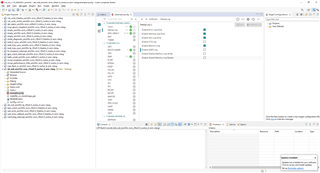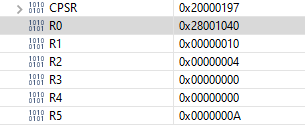Hello,
I still have a problem with loading our application from Flash. I finally got to debug it correctly.
So if I load our Bootloader to the OSPI-Flash and it will load our application, it won't run. If I then connect to it, it stays in a data-abort, which is called by the loaded application (which is located in flash). I can verify that since, when I connect and load the symbols to the stored application from my elf-file (which is the same used to create an appimage with RPRC), I will stay exactly there, so the symbols match which means it's the application which was stored in Flash and loaded correctly by the Bootloader.
So it is not the bootloader which creates this abort and we can see via the connected UART that the bootloader behaves correctly and loads the correct image.
And finally I was able to set a HW-breakpoint at 0x00000000 where our application-vectors are located and where the entry of the application is.
So, I did reset our board and load the bootloader-image directly to the board via CCS (its exactly the same one stored onto flash, even with the debug-symbols). I run this one and then it stops at 0x00000000, so where our loaded application starts (after runCpus()...).
If I do debug like this and just let the application run from here, our application starts and runs as expected. I do not even need to load the symbols. It's exactly the application loaded by the Bootloader. So I cannot see where the abort happens. If I just let the Bootloader run from Flash without loading it via CCS, it crashes into an abort.
I have no more idea how I can debug this one or where I need to have a look or what I am doing wrong here.
Best regards
Felix






